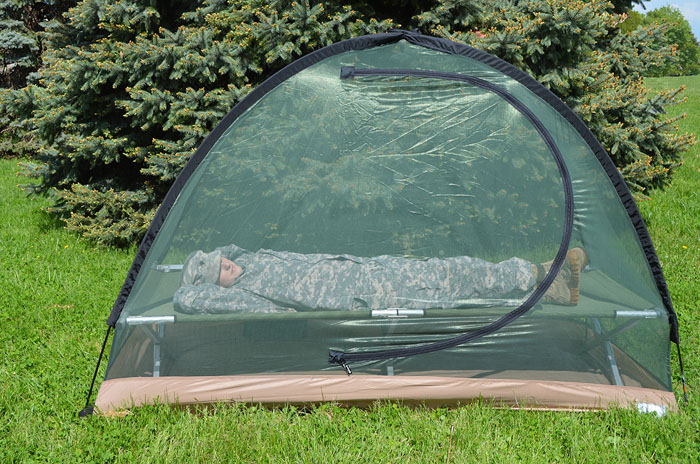New Bed Net Scores High Marks Against Mosquitoes

A long-lasting dual insecticide-impregnated bed net developed by the U.S. Army Medical Materiel Development Activity's Medical Support Systems Project Management Office at Fort Detrick, Md, scored high marks in effectiveness during recent chamber testing with uninfected mosquitoes.
Results showed that mosquitoes will not survive exposure to the treated bed net fabric, thereby reducing soldiers' exposure to diseases such as malaria, Japanese encephalitis, and dengue and yellow fever viruses.
MSS PMO worked with Triton Systems, Inc., under the Army's Small Business Innovation Research Program, and collaborated with Walter Reed Army Institute of Research to develop the treated bed net prototype, known as Egret.
When testing concluded, a computer program calculated the percent of three types of knocked down and dead mosquitoes exposed to the dual insecticide-treated bed net and an untreated control bed net over time.
"The Egret treated bed net passed all requirements," said Robin Todd, executive director of i2L Research, the Baltimore-area laboratory that conducted the tests following Environmental Protection Agency-approved protocols.
"The working prototype introduced a dual impregnation of deltamethrin and permethrin," said Alan Harner, MSS PMO product manager. Harner explained that various mosquito species show resistance to permethrin alone, potentially endangering soldiers deployed in endemic regions such as Korea and Afghanistan.
"There is a critical need for the dual insecticide-impregnated bed nets in Korea," said Steve Hawbecker, MSS PMO project manager, "because of mosquito-borne malaria in the demilitarized zone and Japanese Encephalitis in southern regions." Hawbecker said that more than 28,000 U.S. military are stationed in South Korea.
Because of the dual insecticides used, the bed net must meet all the requirements for EPA registration. Arjan Giaya, vice president of technology for Triton Systems, Inc., suggested that there may be other uses for insecticide-treated fabric, once EPA registration is achieved.
The next step is approval by the Armed Forces Pest Management Board to receive a National Stock Number, or NSN. Having an NSN means the Department of Defense may procure bed nets for deployed forces.
The Egret bed net is simple in design, weighs little more than 3 pounds, allows the user to sit up on a standard or oversized cot, and provides better ventilation using a larger mesh size. The bed net would be carried in a small pouch attached to a soldier's backpack.














